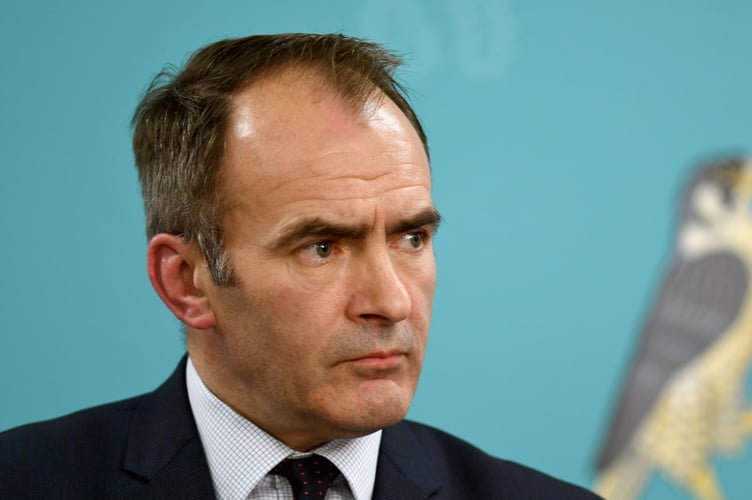The Legislative Council has sat in public in its chambers just 21 times since the September 2021 general election.
Historically, it has sat almost every week apart from during holidays.
Some MLCs have expressed frustration at the situation – which they say is due to there having been little legislation to consider. But they point out that LegCo public sittings are just one small part of their workload.
In total, MLCs – who are paid a basic salary of £67,603 – have so far sat as a branch for just 10 hours and 17 minutes this parliamentary session.
In that time, they have considered just seven pieces of legislation and given leave to introduce a private member’s bill.
This compares with the 33 sittings in the Legislative Council chambers over the same period during the previous administration. During that time – November 2016 to the end of May 2018 – MLCs considered some 21 pieces of legislation.
LegCo also sits as Tynwald court but many members additionally have department or statutory board positions, and roles on standing, select and parliamentary committees – and a lot of their work goes on behind the scenes.

Treasury member Bill Henderson MLC said: ‘LegCo and Keys sit as required, as necessary.’
He said the Cabinet Office should review the government’s legislative programme to see what can be done to speed things up.
‘This is something that’s going to have to be addressed,’ he said.
He said the issue was also felt in the House of Keys whose sittings similarly do not go on much beyond question time.
No questions have been asked during LegCo public sittings this parliamentary session.
Mr Henderson said part of the problem was a resource issue – a lack of legislative drafters in the Attorney General’s chambers and government departments were also finding it difficult to recruit qualified policy and legislation officers.
‘There is a dearth of that expertise across the British Isles,’ he said.
Mr Henderson said there was often a lull in any administration while legislation is being drafted and before it is introduced to the branches and you can end up with a flurry of activity to get bills passed before the end of a parliamentary session.
He said the legislative process can be cumbersome but this was a safety net as ‘the last thing you want is rushed legislation and the law of unintended consequences’.

Chief Minister Alfred Cannan said 19 Acts were promulgated on Tynwald Hill last year and more than 50 Bills are scheduled over the course of this administration.
He said: ‘Although this year’s legislative programme has been slower than we would have ideally liked, we are committed to completing a number of significant legislative changes and improvements during the course of this administration.’
In terms of legislation, MLCs have considered the clauses of, and subsequently passed, the Income Tax Bill 2022 and 2023, Manx Care Amendment Bill, Capacity Bill, Energy Bill, the Trusts and Trustees Bill and the Animal Welfare Bill.
The longest they sat was for 66 minutes to consider the clauses stage of the Capacity Bill. Eleven of the public sittings lasted less than 30 minutes and only one lasted just over an hour.

Tanya August-Hanson MLC was given leave to introduce a private member’s bill on fertilisation, embryology and surrogacy.
She said: ‘In answer to a question at hustings before my recent election, I said the biggest problem facing government is the location and scarcity of policy and legislation officers. Some were moved to the Attorney General’s Chambers at the start of this administration, and out of government bodies.
‘It isn’t expected, or proper, that the AG’s Chambers would provide advice and secondary legislative drafting, and also policy.’
Mr Cannan said there was ‘significant resource occupied in departments’ with the drafting of secondary legislation, in order to implement Acts, for example for legislation related to the Justice Reform Act, Domestic Abuse Act and Sexual Offences Act.
Tynwald president Laurence Skelly said: ‘The ultimate test of legislation productivity for both chambers is Tynwald day where each act is promulgated on the hill by the Deemsters.’

Rob Mercer MLC said: ‘Much of the work takes place outside of the chamber, in preparation for each reading. There are also the monthly Tynwald sittings and committee work.
‘In terms of the amount of legislation coming through, that is for Keys to decide.’
Dawn Kinnish MLC said: ‘As a new MLC the situation has not gone unnoticed.’
Kerry Sharpe MLC said: ‘I can assure you that I am working very hard, despite the small amount of legislation currently moving through the branches.
‘As I said in the last Tynwald, my milkman can attest to how late I work because he can see me late at night through the window of my home office when he drops off the milk!’
Paul Craine MLC said: ‘Numbers relating to LegCo sittings are, of course, only the tip of the iceberg – there is often a considerable amount of work undertaken before and between sittings.
‘And the consideration of draft primary legislation is a only a small part of the role of LegCo members. The reality is that the work could be described as a “bottomless pit” – there is always more work to do!’
This week's Isle of Man Examiner comment was about this topic.




